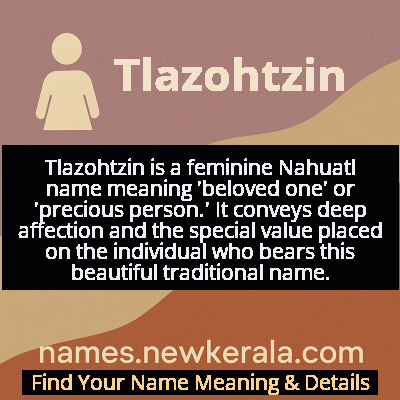Tlazohtzin Name Meaning & Details
Origin, Popularity, Numerology Analysis & Name Meaning of Tlazohtzin
Discover the origin, meaning, and cultural significance of the name TLAZOHTZIN. Delve into its historical roots and explore the lasting impact it has had on communities and traditions.
Name
Tlazohtzin
Gender
Female
Origin
Nahuatl
Lucky Number
7
Meaning of the Name - Tlazohtzin
Tlazohtzin is a feminine Nahuatl name meaning 'beloved one' or 'precious person.' It conveys deep affection and the special value placed on the individual who bears this beautiful traditional name.
Tlazohtzin - Complete Numerology Analysis
Your Numerology Number
Based on Pythagorean Numerology System
Ruling Planet
Neptune (Ketu)
Positive Nature
Intuitive, analytical, spiritual, and inquisitive.
Negative Traits
Secretive, reserved, aloof, and can be overly critical.
Lucky Colours
Green, yellow.
Lucky Days
Monday.
Lucky Stones
Cat’s eye, moonstone.
Harmony Numbers
1, 5, 6.
Best Suited Professions
Scientists, researchers, spiritual leaders, detectives.
What People Like About You
Depth of knowledge, analytical skills, spirituality.
Famous People Named Tlazohtzin
Tlazohtzin
Nahua Noblewoman
Strategic diplomatic marriages that strengthened political alliances between city-states
Tlazohtzin Ixcuinantzin
Nahua Poet
Preserved pre-Columbian spiritual traditions through ceremonial poetry
María Tlazohtzin
Cultural Preservationist
Revitalized traditional Nahua textile arts through teaching and documentation
Name Variations & International Equivalents
Click on blue names to explore their detailed meanings. Gray names with will be available soon.
Cultural & Historical Significance
During the colonial period, the name became a symbol of cultural resistance, as families continued using traditional Nahuatl names to maintain indigenous identity despite Spanish imposition of Christian names. The persistence of Tlazohtzin and similar names represented quiet defiance and cultural preservation. In contemporary indigenous movements, the name has gained renewed importance as part of cultural reclamation efforts, serving as a bridge between ancient traditions and modern identity. It represents not just personal identity but collective memory and the enduring strength of Nahua cultural heritage.
Extended Personality Analysis
Individuals named Tlazohtzin are often characterized by their deep capacity for love and emotional connection. They tend to be nurturing, compassionate, and highly attuned to the feelings of others, creating strong bonds in their personal and professional relationships. Their inherent warmth makes them natural peacemakers and mediators in conflict situations. Tlazohtzin personalities typically exhibit strong intuition and emotional intelligence, allowing them to understand complex social dynamics and provide meaningful support to those around them.
These individuals are often creative, artistic, and drawn to expressions of beauty, whether through traditional arts, music, or storytelling. While gentle in nature, they possess an inner strength and resilience rooted in their cultural heritage and personal convictions. Their loyalty to family and community is unwavering, and they often become pillars of their social circles, offering stability and emotional nourishment to others. The name's cultural weight often instills a sense of responsibility to preserve and honor traditions, making many Tlazohtzins active in cultural or community work.
Modern Usage & Popularity
In contemporary times, Tlazohtzin has experienced a significant revival among Nahua and Mexican-American communities as part of broader indigenous identity movements. While it remains uncommon in mainstream naming charts, its usage has grown steadily among families seeking to reconnect with their ancestral heritage. The name is primarily chosen by parents deeply committed to cultural preservation, often in Mexico's central regions with strong Nahua populations and among diaspora communities in the United States. Modern usage frequently involves combining Tlazohtzin with Spanish or contemporary middle names, creating bridges between indigenous and modern identities. The name's complexity and cultural specificity mean it's typically reserved for special circumstances, making each Tlazohtzin a living testament to cultural continuity and pride.
Symbolic & Spiritual Meanings
Symbolically, Tlazohtzin represents the sacred nature of love in its purest form—not merely romantic affection but the profound bond that connects family, community, and the spiritual world. It embodies the concept of preciousness, suggesting that the named individual is a valuable gift to their community, much like jade or quetzal feathers were treasured in Mesoamerican cultures. The name carries connotations of spiritual wealth and emotional abundance, symbolizing how love nourishes and sustains human relationships. In a broader metaphorical sense, Tlazohtzin represents cultural continuity and the enduring power of indigenous identity, serving as a living connection to ancestral wisdom and traditions that have survived centuries of challenge and change.

